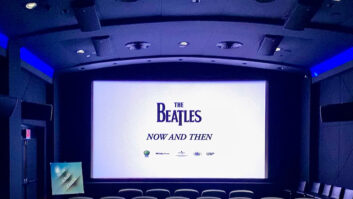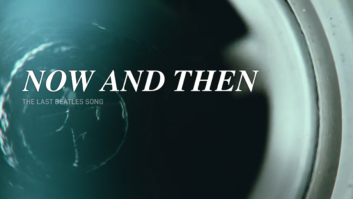Hollywood, CA (May 24, 2017)—It has been called the greatest album ever made. So when tasked with remixing Sgt. Pepper’s Lonely Hearts Club Band for its fiftieth anniversary reissue, producer Giles Martin said, “The first question we ask ourselves is, why?”
As Martin noted, addressing the media at Capitol Studios before playing the remixed album in its entirety, “It’s hardly a bad-sounding record. And it’s also hardly one that was unsuccessful.” The 13-song album, released June 1, 1967, spent months at the top of the charts in the U.K. and the U.S., won four Grammy Awards and went on to sell millions and millions of copies.
The fiftieth anniversary reissue, released May 26 in anticipation of the June 1 anniversary date, is available in a multiplicity of versions, from mono to 5.1, on deluxe and “super deluxe” CD sets and a vinyl half-speed master, together with a limited-edition 7-inch single of “Strawberry Fields Forever” and “Penny Lane,” which was released just prior to Sgt. Pepper. There are extras galore, from documentaries on Blu-ray/DVD to outtakes to a 144-page hardback book.
There were a couple of motivations behind remixing Pepper. Martin, who produced the reissue at Abbey Road Studios with Sam Okell engineering, noted that in late-sixties Britain, “The mono mix was the thing. My father [producer George Martin], [engineer] Geoff Emerick and the Beatles would spend a fair amount of time doing the mono mixes. Then, when it came to stereo, they thought, it’s a novelty, something that people aren’t going to listen to very often.”
Before playing some examples of the mono versions, he commented, “I think John said, ‘If you haven’t heard the mono Sgt. Pepper, you haven’t heard Sgt. Pepper.’ It’s strangely immersive and weirder; it’s more psychedelic.”
So, for this new release, he said, “We’re doing a stereo version of the mono—because we can. We have the technology.”
Indeed, the ambitions of the Beatles and their producer were constrained by the limits of 4-track tape in 1967, resulting in the unorthodox stereo mixes on Pepper, where vocals and instruments are frequently on opposite sides, and even change sides during the song. On A Hard Day’s Night, said Martin, they used only three tracks of a 4-track machine, but on Pepper, they used multiple 4-track tapes, filling one tape, bouncing tracks down, adding overdubs and bouncing again.
“‘Getting Better’ and ‘Lovely Rita’ have three bounces,” he reported. “They recorded the band, quite often with bass later; it’ll be guitars, drums, piano, on one 4-track. That’s bounced and laid down to one track on another 4-track. Then they record maybe bass, piano, backing vocals, then that’s bounced again.” They then mixed off the third tape.
The second motivation behind this remix, Martin said, was that he could work from transfers of those initial tape tracks rather than just the final 4-track, a process he and his father used in 2007 on the mash-up mixes of Beatles songs for Cirque du Soleil’s Love production. On this new release, he said, “You’ll hear the band playing. It’s not us, it’s those previous generations of tape. Taking off layers means that you’re in the room with the band. You suddenly realize what a great band they are.”
Martin’s new mixes recreate the immersion and psychedelia of the mono versions while also smoothing out some of the idiosyncrasies of the original stereo release. The remixed songs remain faithful to the originals, yet have much more impact, especially the drums, which practically jump out of the speakers at times.
To present the new remixes at their best, PMC supplied a pair of the company’s BB6-XBD-A Active monitors—an appropriate choice, given that Miles Showell, the Abbey Road engineer responsible for the half-speed vinyl master of the new reissue, is a longtime PMC user. PMC USA president Maurice Patist was on-site to set up the speakers, initially for an industry playback session the evening prior to the media event, positioning gobos and rugs around Capitol’s Studio 1 to create as broad and consistent a stereo image as possible.
Commenting on the presentation, Peter Thomas, owner and managing director of PMC, said, “Sgt. Pepper’s was such a ground-breaking album when it was released 50 years ago and now, with the skills, dedication and love of such a dedicated team of engineers, it has been re-presented for today’s music lovers. This once again highlights that PMC is the ideal playback system, from studio to home. To be a part of this process and presentation of this release is something all of us at PMC are immensely proud of.”
The outtakes chosen for inclusion on the reissue package are revealing. “What they show us is that a great album like Sgt. Pepper is actually a combination of a bunch of ideas; it’s the question of choosing the right ones,” said Martin. “It’s just humans; there’s no mysticism, just really, really good people making really, really good sounds.”
The anniversary remix project was Beatle-approved from inception. Martin then had the daunting task of playing the finished results to Sir Paul McCartney at his studio in Rye, England. “I know I wouldn’t be doing this if I wasn’t the son of George Martin. That’s a legacy to bear; you can’t take that for granted,” he said. “It’s humbling.”
For much more from Giles Martin on remixing the album and the re-release as a whole, see our blog post, Giles Martin Dissects The Sgt. Pepper 50th Anniversary Remix.






